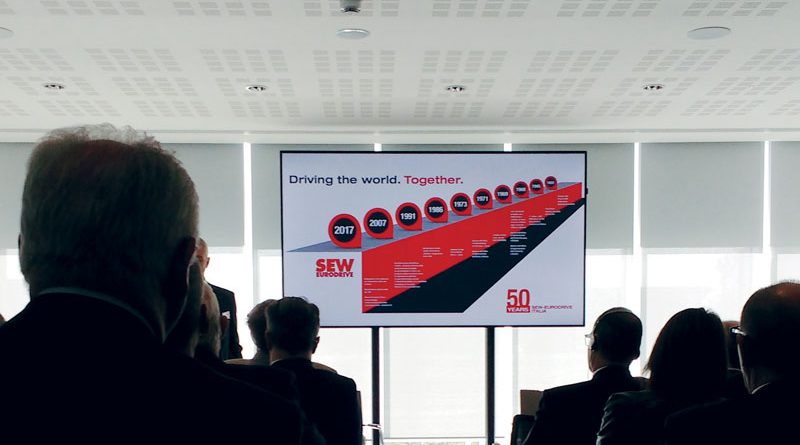A Half Century of Innovation Towards the Smart Factory
SEW-EURODRIVE Italy is celebrating its 50th anniversary: a half century of innovation and technological development towards the Smart Factory. The fully modernized plant in Solaro, near Milan, perfectly reflects this journey: a physical space featuring new ways to interact and share.
by Silvia Crespi
Last October, under the watchful gaze of Juergen Blicke, President and Managing Partner of the German multi-national SEW EURODRIVE, with the presence of key clients, press and industrial associations, 50 years of SEW-EURODRIVE Italy were celebrated at the fully refurbished plant in Solaro, Lombardy.
Giorgio Ferrandino, Italian General Manager welcomed all present and thanked those
who have made this half-century one of industrial success: “More than a simple celebration of continued success over time, this anniversary marks the beginning of a new approach, one necessary to face the future and reach the goals that the ever changing market will set us”.
The event was the perfect moment to present “Driving the world. Together”, a book that looks back over the first fifty years of business. From its foundation, the Italian branch has never stopped growing: growth that increasingly looks towards technological innovation and sustainability.
Juergen Blicke joined in the well-wishers, focusing on what he calls the “pathway of excellence”. Following this, the German multinational is able to adapt to the needs and specificities of the Italian market, making the evolution from past to present to future one seamless journey.
Evidence of change can certainly be seen in the fully renovated plant in Solaro, near Milan, a true step toward the Smart Factory, officially inaugurated with the symbolic cutting of the ribbon by President Blickle himself.
To get a first-hand feel of the results reached, the Operations and Solutions Engineering team organized a guided tour around the plant, including stop offs at the various “smart” terminals in the all new assembly workshop.
The role of the human factor grabbed attention at the round
table meeting
During the morning, a hotly debated round table discussion got underway which included Federico Visconti, Rector at LIUC Università Cattaneo and Mirko Otranto, HR Manager and presented by Luca Orlando, journalist at the financial newspaper, il Sole 24 Ore. The human factor was at the centre of debate, as we live through a historically game changing epoch for industry: digitalisation. To face and gain from the challenges the future holds, people are the key.
“SEW-EURODRIVE Italy is a particularly “smart” set up, one of the most advanced in all of Italy regarding Lean Production and Smart Manufacturing – began Mirko Otranto. Industry 4.0 needs, however, certain skill sets that are still lacking here in Italy, experts in mechatronics would be just one example… that such professional figures are perfectly adapted to teamwork is another key factor. High quality profiles are of no use should they not be able to integrate into the productive context fluidly with colleagues. Young graduates must be encouraged to enter the field, over and above the simple question of salary, through the creation of “attractive context”. Youngsters need to understand the evolution that has taken place in the workshop and factory since new technology has become an everyday part of the working experience. Collaborative robotics, for example, is increasingly present in industry, the same goes for the use of tablets…”. Training now takes place on these new tools, meaning operators have a level of independence never before enjoyed, leading to changes in the whole hierarchy of companies. In other words, workers are shifting from “controlled” to “controllers”.
“In such a situation – concludes Otranto – schools can also do their part. Setting up students’ futures while still at school is crucial. At the end of secondary school, students are often faced with, but unprepared for, making fundamental decisions concerning their future”.
Federico Visconti outlines the make up of the Italian manufacturing sector today, with 20÷25% of companies representing genuine excellence in their field but a further 50% rather making up the numbers. “A change of mentality is required in management here in Italy – he believes. To remain competitive, skills and technology need to be shared. Networking across companies, especially in supply chain, will be essential”. Visconti wishes there to be a “two way” university system set up with academic skills combined with technical/practical training within companies, following the model of the business school. l

